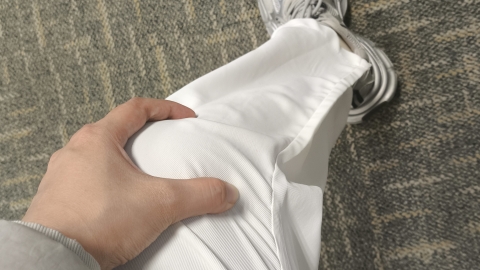Numbness in the hands and feet may be a symptom of what disease?
Generally, numbness in the hands and feet may be a symptom of various diseases, such as peripheral neuritis, carpal tunnel syndrome, cervical spondylosis, diabetic peripheral neuropathy, cerebral infarction, and others. A detailed analysis is as follows:

1. Peripheral Neuritis
Peripheral neuritis caused by poisoning, infection, malnutrition, or other factors may lead to damage of peripheral nerves in the distal limbs, resulting in abnormal nerve function and causing numbness in the hands and feet. It may also be accompanied by reduced sensation. Medications such as vitamin B12 tablets, acyclovir tablets, and ganciclovir tablets may be used under a doctor's guidance.
2. Carpal Tunnel Syndrome
Extrinsic pressure or occupational factors may cause repeated and abrupt changes in pressure within the carpal tunnel, compressing the median nerve. This may cause numbness in the fingers and may also be accompanied by weakness when holding objects. Treatment may include medications such as mecobalamin tablets, vitamin B6 tablets, and diclofenac sodium tablets, under a doctor's guidance.
3. Cervical Spondylosis
Degenerative changes in the cervical intervertebral discs and secondary degenerative changes in the intervertebral joints can cause damage to the spinal cord, nerves, and blood vessels. When cervical lesions compress the nerve roots, numbness in the hands and feet may occur, possibly accompanied by symptoms such as neck and shoulder pain. Medications such as chlorphenesinamate and meloxicam tablets, celecoxib capsules may be used as directed by a physician.
4. Diabetic Peripheral Neuropathy
Prolonged high blood sugar levels can damage nerve fibers, leading to diabetic peripheral neuropathy, which may cause numbness in the hands and feet, as well as pain. Treatment may involve medications such as metformin hydrochloride sustained-release tablets, glipizide tablets, and epalrestat capsules, as prescribed by a physician, to help lower blood sugar levels and provide nerve nutrition.
5. Cerebral Infarction
Cerebral infarction occurs due to blockage of blood vessels in the brain, leading to ischemia and hypoxia in brain tissue. This may result in insufficient blood supply to the brain, causing symptoms such as hemiplegia, contralateral numbness, dizziness, and seizures. Treatment may include medications such as aspirin enteric-coated tablets, defibrinating enzyme for injection, and batroxobin injection, under a doctor's guidance.
If symptoms of numb hands and feet appear, it is recommended to seek medical attention promptly so that a doctor can make a diagnosis and provide treatment based on the specific condition. Additionally, maintaining good lifestyle habits and a positive mindset, such as avoiding prolonged postures, keeping warm, and engaging in appropriate physical exercise, can also help prevent the occurrence of hand and foot numbness.
References:
[1] Liu Li. Numbness and Pain in Hands and Feet: Be Alert to Peripheral Neuropathy [J]. Food and Health, 2024, 36(01): 23.
[2] Bian Ji. Numbness in Hands and Feet Should Be Taken Seriously [J]. New Countryside, 2020, (07): 41-42.






